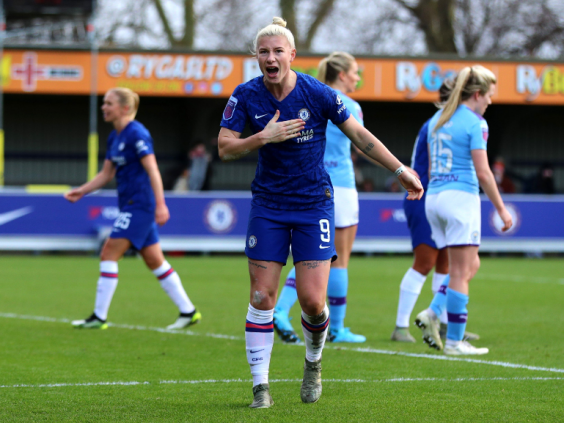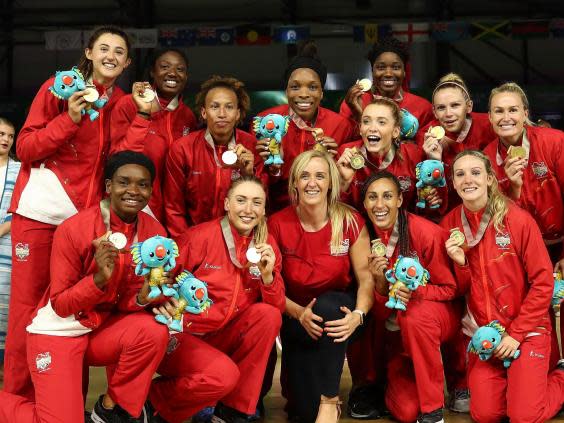How coronavirus left women’s sport looking for loyalty
As women’s sport powered through numerous ceilings, each shattering of glass required certain assistance to pack a telling punch. Male advocates, greater representation at boardroom level, more elite female coaches or paying consumers.
But now that a movement which showed no signs of stopping has been brought to a neck-jarring halt by coronavirus, it needs one thing and one thing only. Loyalty.
Loyalty to a product that has shown itself to be great. Loyalty of the various commitments of support, be it love or money. Loyalty that will be regarded as even more progressive through sickness than health.
It was two months ago that over 86,000 piled into the Melbourne Cricket Ground for the women’s T20 World Cup Final. The first season of the Women’s Super League’s multi-million title sponsor deal with Barclays was bubbling to a thrilling climax with Manchester City, Chelsea and Arsenal separated by four points at the top into the home straight.
And with the Tokyo Games taking a big step forward in equal representation of women at the Olympics – 48.8 per cent according to the IOC’s projections - 2020 was not simply going to be another marquee year for women’s sport. But one that saw it emerge from the shadows of its male equivalents and stand its own ground, both figuratively and commercially. This enforced hiatus could not have come at a worse time.
For it is not just clipping wings but also exposing the fragility of the levels of women’s sport. It’s not that the foundations are made of sand – it’s that they were still being built.
None of that should be a surprise. Progression at any speed is never uniform for top and bottom.
For instance, the disparity in women’s football is a more pronounced version of the men’s. But the voiding of tiers three to seven has been a kick to the gut for the teams in the National League Northern and Southern Divisions (the first tier below the WSL and the Championship) who have put measures in place to become semi-professional. Even those who had just made the step up into that bracket are wary. There is a lot of anger from clubs in the football pyramid, to an extent where legal action is being considered.
“Seasons declared null and void seemed like a move taken without a lot of forethought,” says Carrie Dunn, an academic and journalist on women’s football, whose recent book “The Pride of the Lionesses” investigated whether the growth women’s football was uniform at all levels.
“There are teams who have been bracing themselves for the move to semi-professional status. That’s a huge deal considering the requirements over sponsorships, budgets and the need for a new infrastructure. Likewise for teams looking to go from there into full professionalism.
"‘Project Restart’ is focusing on the Premier League. It does seem to be that the Championship and perhaps League One and League Two are lower down the priority list. And I would imagine WSL and the Championship come below them. So there’s uncertainty as you move down that chain.”

Nevertheless, women’s football can rest easy to an extent given it falls under the umbrella of the Football Association. That’s not quite the case for the likes of tennis and has led to talks of a potential realignment, with the Women’s Tennis Association joining with the men’s ATP. Indeed, that sense of “all being in this together” is more worthwhile in these situations, where considerations moving forward come as a collective.
“Making sure our plans are joint during this pandemic has helped us provide our staff, athletes and coaches with a degree of peace of mind,” says Joanna Coates who took on her role as chief executive of UK Athletics six days before this year’s Olympic and Paralympic Games were postponed. A further bombshell came in the week with the cancellation of July's Anniversary Games.
“Our planning at this moment in time is as it is for men as it is for women, despite not all our events being for both sexes. The sport commercially and performance led is done on a very joint basis. I don’t see there being any disparity when I came in. All of our commercial stuff is built around men and women.”
Yet, as Coates highlights, the women’s sports that look more robust from the outside are the ones in greater strife. Many of them had moved on from handouts and into making their own money.
“That’s another sad point with this whole situation,” she says. “Women’s sport has worked so very hard to commercialise itself. If your entire program is supported by government money, whether through UK Sport or Sport England, you’re actually in an okay position.
“But those sports which have commercialised themselves and do not rely on the public purse are worse off. Athletics fits into that: we are a third funded by government and two-thirds from what we make. We’ve been successful at the latter. But when something like this hits where you have no events, you’re in a worse position than those that don’t make money.”
This is where netball finds itself in a quandary.
As a women’s only sport at the top levels in this country, there was no established male equivalent to ride along with. Its emergence is as much through a well-executed strategy from 2016, with Commonwealth Gold in 2018 into a home World Cup in 2019, as the unseen graft from those behind the scenes. People like Coates, who spent a decade at England Netball in roles as commercial director and a four-and-a-half year stint as CEO.

At the time of writing England Netball have not applied for any government support, but franchises as part of the 10-team Superleague have furloughed their playing squads after the competition was suspended on 15 March. And while there is scope for a return with the easing of lockdown, the prospect of playing the remainder of the season behind closed doors is a significant problem.
“You’d be moving the sport back to when I used to play when you’re just playing in a sports hall,” former England coach Tracey Neville told the Daily Telegraph last week, objecting to continuing without being able to allow fans into venues. Coates, who identified fan engagement as a key pillar during her time in netball, agrees.
“It’s a very similar situation to smaller football clubs,” she says, “where the majority of the money that funds the clubs comes from ticket revenue. Yes, there’s a duty to the integrity of the competition, but these clubs are sailing really close to the wind. If there is nobody buying tickets how are they going to fund paying players?”
Neville’s talk of “just playing in a sports hall” raises another widely held fear. The acceleration of women’s sport has been uphill. Once that stops, there is no standing still. Things will only go backward.
Almost by default, that has been reflected in some of the conversations being had. Director of women’s cricket Clare Connor stated that the men will take precedent to salvage the international summer, despite no talk within the England & Wales Cricket Board of the women's team having to cede any ground just yet.
There is also a worry broadcasters looking to recoup vast sums of money will focus on more traditional male sports. That temptation will be fuelled by the viewing and social media numbers achieved through replaying old matches. The BBC and Sky Sports have been dovetailing with re-runs of old cricket matches, such as the Edgbaston Test from the 2005 Ashes which “concluded” on Sunday. ITV have done similar by opening their Euro 96 vault this week. Unquestionably, and inevitably, men are winning the nostalgia war.
“There’s definitely a temptation for broadcasters to think like that,” says Coates. “When you look at it from an out-and-out commercial decision, it will make sense. Because that’s how they used to make their calls, and they fundamentally changed that position. But the amount of lost revenue may change that - and I really hope it doesn’t.”
There are positives to clutch at. The appetite for any sport at all has seen fans turn to the far reaches of Belarus, South Korea and eSports for their fixes. Perhaps now even those diehard detractors will have a more open mind.
The WSL, with its smaller backroom staff and lower likelihood of people congregating outside grounds, could be a step towards bringing football back outright. There is also talk for the England Women’s cricket team potentially rattling through a whole series - three ODIS and three T20is - in the space of six days, meaning they would need just over a fortnight to fulfil their originally planned schedule, provided it is safe for India and South Africa to tour. Sports not ingrained in British culture, like netball, have long had trouble converting recreational players to paying supporters, are hopeful the absence will get these individuals rallying behind them.
So far support from broadcast companies and brands have remained in place. There will be a temptation to chase their losses, but the last few months should not cloud their view of the last few years.
Together, they played their part in affecting real societal change. Just as equality benefits all, so it is that the strength of women’s sport post Covid-19 will be crucial to the health of sport as a whole.

